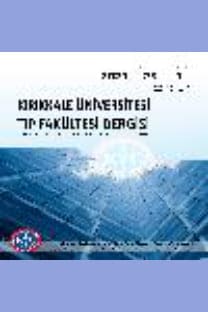SAĞLIK ÇALIŞANLARIN COVID-19 HAKKINDAKİ GÜNCEL BİLGİ VE FARKINDALIK DÜZEYLERİ
Sağlık çalışanları, bilgi, farkındalık, COVID-19
The Current Knowledge and Awareness Levels of Healthcare Workers About COVID-19.
Health workers, knowledge, awareness, COVID-19,
___
- WHO (COVID-19) Homepage [Available from: https://COVID19.who.int/.
- T.C. Sağlık Bakanlığı [Internet]. T.C. Sağlık Bakanlığı COVID‐19 Durum Raporu Türkiye.[Available from: https://COVID19.saglik .gov.tr/TR-66935/genel-koronavirus-tablosu.html.
- Wu Z, McGoogan JM. Characteristics of and important lessons from the coronavirus disease 2019 (COVID-19) outbreak in China: Summary of a report of 72 314 cases from the Chinese Center for Disease Control and Prevention. Jama 2020;323(13):1239-42.
- https://www.ttb.org.tr/kollar/COVID19/haber_goster.php?Guid=93f50274-c786-11ec-8bef-40694c436a 49
- Kaya S, Uzdil Z, Cakiroğlu FP. Evaluation of the effects of fear and anxiety on nutrition during the COVID-19 pandemic in Turkey. Public Health Nutr. 2021;24(2):282-9.
- Vardavas CI, Nikitara K. COVID-19 and smoking: A systematic review of the evidence. Tob Induc Dis. 2020;18:20.
- https://data.tuik.gov.tr/Bulten/Index?p=Turkiye-Saglik-Arastirmasi-2019-33661
- The epidemiological characteristics of an outbreak of 2019 novel coronavirus diseases (COVID-19) in China. Zhonghua Liu Xing Bing Xue Za Zhi. 2020;41(2):145-51.
- Lahner E, Dilaghi E, Prestigiacomo C, Alessio G, Marcellini L, Simmaco M, et al. Prevalence of SARS-CoV-2 infection in health workers (HWs) and diagnostic test performance: The Experience of a Teaching Hospital in Central Italy. Int J Environ Res Public Health 2020;17(12):4417.
- Rajme-López S, González-Lara MF, Ortiz-Brizuela E, Román-Montes CM, Santiago-Cruz J, Mendoza-Rojas MÁ, et al. Large-scale screening for severe acute respiratory coronavirus virus 2 (SARS-CoV-2) among healthcare workers: Prevalence and risk factors for asymptomatic and pauci-symptomatic carriers, with emphasis on the use of personal protective equipment (PPE). Infection Control & Hospital Epidemiology. 2022;43(4):513-7.
- Salopek-Žiha D, Hlavati M, Gvozdanović Z, Gašić M, Placento H, Jakić H, et al. Differences in distress and coping with the COVID-19 stressor in nurses and physicians. Psychiatr Danub 2020;32(2):287-93.
- Albarracin Z, Silverman M, Mineo J, Al-Abbasi B, Koff S, Martell C, et al. Health care workers' knowledge, attitudes, and beliefs related to COVID-19 in palliative medicine and hospice care. Palliat Med Rep 2020;1(1):331-8.
- Sumiya A, Pavesi E, Tenani CF, de Almeida CPB, Macêdo JA, de Checchi MHR, et al. Knowledge, attitudes, and practices of primary health care professionals in coping with COVID-19 in Brazil: a cross-sectional study. Rev Bras Med Trab. 2021;19(3):274-82.
- Alemu T, Legesse S, Abera A, Amare S, Maru M, Shiferaw B, et al. Health professionals' knowledge, attitude and practices regarding COVID-19 in Dessie City, Northeast Ethiopia: a facility-based cross-sectional study. Front Public Health 2022;10:899808.
- Kurtuluş Ş, Remziye C. What do health care professionals think about COVID-19 vaccine applications: A university example. Harran Üniversitesi Tıp Fakültesi Dergisi. 2021;18(1):29-34.
- Gagneux-Brunon A, Detoc M, Bruel S, Tardy B, Rozaire O, Frappe P, et al. Intention to get vaccinations against COVID-19 in French healthcare workers during the first pandemic wave: a cross-sectional survey. Journal of Hospital Infection. 2021;108:168-73.
- Basavaraj TJ, Shashibhushan BL, Sreedevi A. To assess the knowledge, attitude and practices in biomedical waste management among healthcare workers in dedicated COVID hospital in Bangalore. Egypt J Intern Med. 2021;33(1):37.
- Ioannou P, Karakonstantis S, Mathioudaki A, Sourris A, Papakosta V, Panagopoulos P, et al. Knowledge and perceptions about COVID-19 among health care workers: Evidence from COVID-19 hospitals during the second pandemic wave. Trop Med Infect Dis 2021;6(3):136.
- Bhagavathula AS, Aldhaleei WA, Rahmani J, Mahabadi MA, Bandari DK. Knowledge and perceptions of COVID-19 among health care workers: Cross-Sectional study. JMIR Public Health Surveill 2020;6(2):e19160.
- Fetansa G, Etana B, Tolossa T, Garuma M, Tesfaye Bekuma T, Wakuma B, et al. Knowledge, attitude, and practice of health professionals in Ethiopia toward COVID-19 prevention at early phase. SAGE Open Med. 2021;9:20503121211012220.
- Rincón Uribe FA, Godinho RCS, Machado MAS, Oliveira K, Neira Espejo CA, de Sousa NCV, et al. Health knowledge, health behaviors and attitudes during pandemic emergencies: A systematic review. PLoS One. 2021;16(9):e0256731.
- ISSN: 2148-9645
- Yayın Aralığı: 3
- Başlangıç: 1999
- Yayıncı: KIRIKKALE ÜNİVERSİTESİ KÜTÜPHANE VE DOKÜMANTASYON BAŞKANLIĞI
YENİDOĞAN YOĞUN BAKIM ÜNİTESİNDE YATAN HASTALARDA İNFLAMATUAR BELİRTEÇLERİN TANI VE PROGNOZDAKİ YERİ
Nagihan Akıcı KARA, Nilufer GUZOGLU, Didem ALİEFENDİOĞLU
Hüseyin Fatih SEVİNÇ, Serhat DURUSOY, Veli Çağlar ÖZ, Recep Doğan İLHAN, Ömer PIÇAKÇI, Abdurrahman ÖRTÜCÜ, Ramazan İlter ÖZTÜRK
Serap KİRKİZ, Özlem ARMAN BİLİR, Fatih Mehmet AZIK, Çiğdem SÖNMEZ, Hüsniye Neşe YARALI
ÜNİVERSİTE ÖĞRENCİLERİNİN E-ÖĞRENMEYE YÖNELİK TUTUMLARININ BELİRLENMESİ
Zeynep KİSECİK ŞENGÜL, Ali YILMAZ, Yurdagül ERDEM
SAĞLIK ÇALIŞANLARIN COVID-19 HAKKINDAKİ GÜNCEL BİLGİ VE FARKINDALIK DÜZEYLERİ
Gebelik Kaybında Kromozom Analizinin Zorlukları: 1208 örnek deneyiminden çıkarılan dersler
